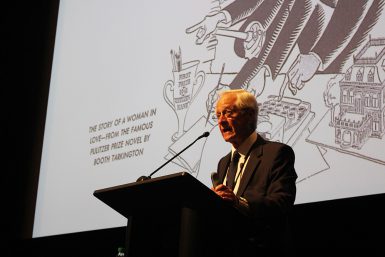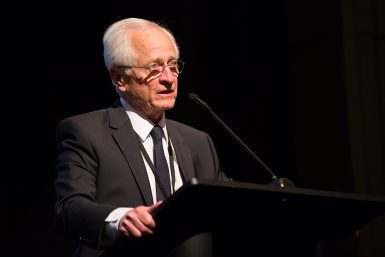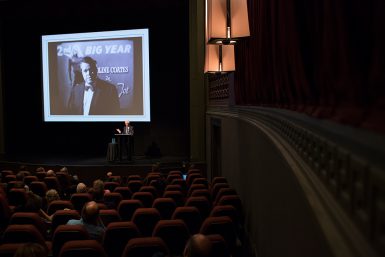Naremore discusses Welles’ contributions, controversies in keynote

Professor Emeritus James Naremore discussed Orson Welles’s life, many occupations and controversies during the keynote address for 100 Years of Orson Welles: Master of Stage, Sound and Screen, Thursday at the Indiana University Cinema.
The symposium began Wednesday and continues through Sunday, featuring presentations and panel discussions, and screenings of some of the prolific filmmaker-actor-director’s work. This year marks the 100th anniversary of Welles’ birth.
“As a man of the theater, Welles was often a magician,” said Naremore, whose book, The Magic World of Orson Welles, will be published in June.
Welles directed films such as Macbeth (1948) and Citizen Kane (1941), as well as the provocative radio drama War of the Worlds (1938). In addition to being a director, Welles was also an actor, writer and producer.

A scholar of Welles’ work, Naremore remembered his many roles, sharing a cartoon of Welles drawn with eight arms. The cartoon was captioned, “Hollywood’s most amazing citizen now brings you his successor to Citizen Kane.”
Welles was not always a popular commodity in Hollywood, however, and his bank account reflected this.
“Often, he used earnings from his acting jobs to promote his films,” Naremore said.
War of the Worlds, a radio play about invaders from Mars, ignited national discussion and, sometimes, panic. After it captivated the U.S. radio listening audience, Howard Koch, a fellow Hollywood writer, tried to claim creative ownership of the radio piece. Naremore said although Welles often collaborated with writers, the idea for presenting the drama as a new broadcast was Welles’.

Not only did he design the broadcast, Welles also was claimed responsibility for the national panic. Those listeners who missed the introduction at the beginning thought that the world really was being invaded by Martians.
The visionary’s peak was in the Roosevelt era, according to Naremore, when Welles made seven films. Welles was investigated by the FBI because of government suspicions that he was a communist.
In his talk, Naremore drew on his forthcoming book as he set the tone for the five days focusing on the filmmaker. He said he was pleased that his book not only examined the stylistic aspects of Welles’s filmmaking but also the political role he played in society. Naremore recounted a 1982 interview when Welles said what he was best at was talking to audiences, which made him think he should’ve been in politics.
The symposium has brought scholars from around the world to discuss aspects of Welles’ career and life, from his theater and radio beginnings to his innovative projects he produced or worked on throughout his life.
IU Cinema, IU Libraries and The Media School are sponsors of the symposium.
More:

